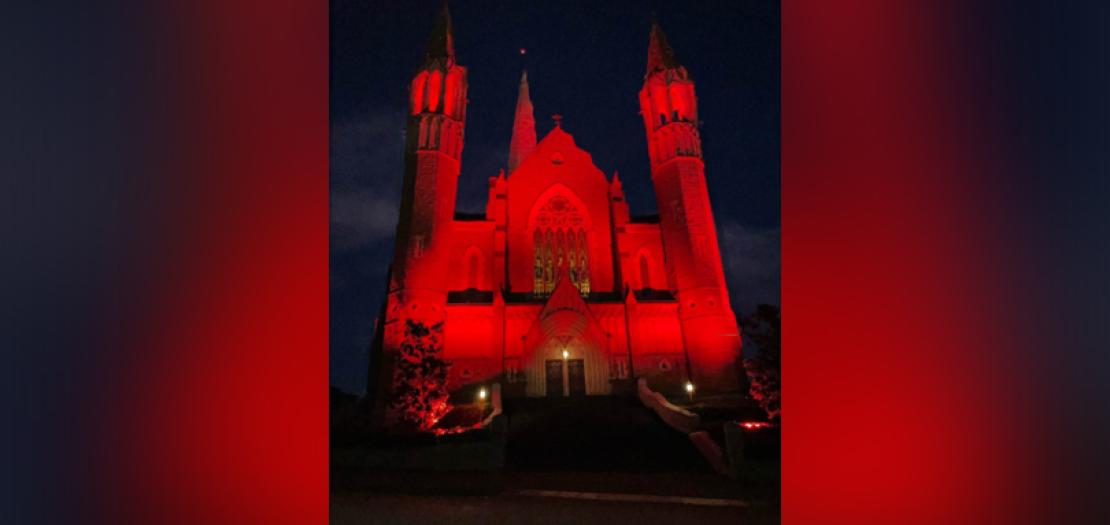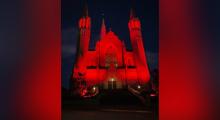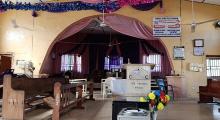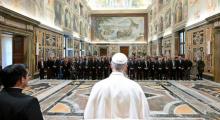Issued by the Catholic Center for Studies and Media - Jordan. Editor-in-chief Fr. Rif'at Bader - موقع أبونا abouna.org

On Red Wednesday, 19 November, more than 600 churches, cathedrals, and public buildings around the world were lit in red to show solidarity with and raise awareness of the plight of those who are persecuted for their faith.
St George’s Cathedral, Southwark, was illuminated in red and hosted ACN’s Red Wednesday Mass, celebrated by Bishop Nicholas Hudson, auxiliary in Westminster and bishop-elect of Plymouth.
During the Mass, Tobias Yayaha from Sokoto, a catechist from northwest Nigeria who continued his ministry after being nearly stabbed to death by extremists, was presented the ACN Courage to be Christian Award.
ACN released their latest Religious Freedom in the World Report, the only global report by a non-governmental organisation that systematically documents the situation of religious freedom in every country, on 21 October.
Although ACN is a Pontifical Foundation of the Catholic Church, the report documents abuses, violations and restrictions on the religious freedom of all religions, and highlights that, if religious freedom is denied to one group, there is no true religious freedom for anyone.
The research found that there have been grave violations of religious freedom in 62 countries: 24 countries were classified as experiencing religious persecution, which involves violence, arrest, and repression, and 38 as experiencing religious discrimination, for example marginalisation or legal inequality for religious minorities.
This means that almost 5.4 billion people, nearly two thirds of humanity, live in countries where serious religious freedom violations take place.
ACN found that the situation has worsened in the two years since their last report in 75 per cent of the countries affected by religious persecution. Only two countries, Kazakhstan and Sri Lanka, showed improvement.
They found that authoritarian regimes are the greatest threat to religious freedom, because they have systematically enforced legal and bureaucratic mechanisms to suppress religious life.
In addition, they noted a rise in religious nationalism in the period in which they conducted the research, leading to an increase in the exclusion and repression of minorities. In countries such as India, Myanmar, Palestine, Israel, Sri Lanka, and Nepal, national identity is increasingly shaped by ethno-religious nationalism, eroding minority rights.
The report said, “Majoritarian narratives are weaponised to consolidate power, while legal and administrative systems often entrench second-class status for minorities.”
The research also found that religious freedom has become a global casualty of war amid a spike in conflict situations around the world, and that persecution is an overlooked major driver of the global displacement crisis.
The report states that more than 123 million people worldwide have been forcibly displaced, either within the borders of their home countries or seeking international protection in another country as refugees, and that religious persecution and discrimination are persistent forces driving this massive process.
Dr José Luis Bazán, legal advisor on international religious freedom, migration, and asylum in the Commission of Catholic Episcopal Conferences of the European Union, said, “Faith-based persecution and discrimination by state or non-state actors leads the victims from a religious community to leave their homelands, erasing their historical contribution to the identity of that country where they were present, in many cases for centuries.
“This erodes religious diversity and paves the way for religious sectarianism, widening the gap with other regions of the world where religious pluralism exists.
Over 1.3 million predominantly Muslim Rohingya have Fed Myanmar due to targeted violence. Before Syria plunged into a 13-year civil war, Christians made up about 10 per cent of the population, while now they represent only about 2 to 3 per cent. The same fate has befallen Christians in other Middle Eastern countries like Iraq.”
The research also found that there has been a sharp rise in antisemitic, anti-Muslim, and anti-Christian hate crimes in Western countries. In addition, faith-based institutions in Western democracies such as Belgium are under growing legal pressure to provide services such as abortion and assisted suicide.
The report highlighted that interfaith initiatives show that religious freedom can serve as “a foundation for unity and a safeguard for human dignity”. It emphasised the crucial role of education in “fostering social cohesion, affirming the equal worth of all individuals, and empowering minority groups both culturally and economically”.
The report cited the example of schools in Lebanon where Christian and Muslim pupils study together. Marielle Boutros, ACN representative for Lebanon, Syria, and Egypt, said, “They not only share the same academic curriculum but also build daily experiences of mutual respect and friendship. They grow up together, discovering each other’s traditions, values and beliefs – not from textbooks, but through genuine human relationships. This daily interaction fosters mutual respect and challenges prejudices.
“Due to the current crisis in Lebanon, these schools risk closure, endangering the spiritual formation of a generation, eroding community life, and accelerating the demographic decline of the Christian community. Their absence could create a vacuum which might then be filled by institutions lacking moral foundations or by radical actors, undermining decades of interreligious coexistence and fuelling mistrust, polarisation, and extremism.
“Supporting schools with an explicit commitment to inclusivity, moral formation, and interreligious engagement is a strategic investment in social stability. For minorities, access to such is both a shield against discrimination and a gateway to socio-economic empowerment. Preserving and expanding such educational spaces is not simply an academic or developmental concern – it is a moral imperative and a strategic necessity for building pluralistic, resilient, and just societies. This is the hope in which we invest.”







